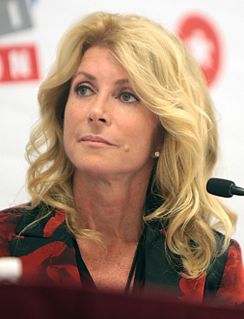A Quote by Joyce Maynard
At Home in the World is the story of a young woman, raised in some difficult circumstances, and how she survives. It tells a story of redemption, not victimhood.
Related Quotes
Mine is a story about a teenage single mother who struggled to keep her young family afloat. It's a story about a young woman who was given a precious opportunity to work her way up in the world. It's a story about resiliency, and sacrifice, and perseverance. And you're damn right it's a true story.
The Hillary Clinton story basically is this. And see how similar this sounds to the old days before the modern era of feminism raised its head. You're a girl, you're a young woman, what do you do? You go off to college. That's what she did. Why do you go? To meet your husband. That's what she did. She wouldn't be where she is if it weren't for her husband.
A man who tells secrets or stories must think of who is hearing or reading, for a story has as many versions as it has readers. Everyone takes what he wants or can from it and thus changes it to his measure. Some pick out parts and reject the rest, some strain the story through their mesh of prejudice, some paint it with their own delight. A story must have some points of contact with the reader to make him feel at home in it. Only then can he accept wonders.
An interesting example is that the worst woman in the book, who is so cruel and violent, is the sorceress in "The Prince of the Black Islands." She's a beautiful young woman, and she has turned her husband into stone from the waist down. A traveling sultan finds him, in his dreadful state, and the man petrified from the waist down tells his sad story...how his wife comes every afternoon and beats him until the blood runs down. She's just unwontedly, arbitrarily cruel.
Tell me the story, Pew. . . . It was a woman. You always say that. There's always a woman somewhere, child; a princess, a witch, a stepmother, a mermaid, a fairy godmother, or one as wicked as she is beautiful, or as beautiful as she is good. Is that the complete list? Then there is the woman you love. Who's she? That's another story.
Worldviews have four elements that help us understand how a person's story fits together: creation, fall, redemption, and restoration. "Creation" tells us how things began, where everything came from (including us), the reason for our origins, and what ultimate reality is like. "Fall" describes the problem (since we all know something has gone wrong with the world). "Redemption" gives us the solution, the way to fix what went wrong. "Restoration" describes what the world would look like once the repair begins to take place.
The Universe story is the quintessence of reality. We perceive the story. We put it in our language, the birds put it in theirs, and the trees put it in theirs. We can read the story of the Universe in the trees. Everything tells the story of the Universe. The winds tell the story, literally, not just imaginatively. The story has its imprint everywhere, and that is why it is so important to know the story. If you do not know the story, in a sense you do not know yourself; you do not know anything.
He thought about the story his daughter was living and the role she was playing inside that story. He realized he hadn't provided a better role for his daughter. He hadn't mapped out a story for his family. And so his daughter had chosen another story, a story in which she was wanted, even if she was only being used. In the absence of a family story, she'd chosen a story in which there was risk and adventure, rebellion and independence.
Every family has a story that it tells itself, that it passes on to the children and grandchildren. The story grows over the years, mutates, some parts are sharpened, others dropped, and there is often debate about what really happened. But even with these different sides of the same story, there is still agreement that this is the family story. And in the absence of other narratives, it becomes the flagpole that the family hangs its identity from.
I came across an old story of mine that I'd written a decade ago. The main joke of the story is that a mother is telling her children about how she met their father online. The majority of memories the mother has all have to do with really funny links he sent her, a music download that she loved, etc. - and because of these superficial details she fell in love with the father. Reading it today, it's hardly a dystopian story; it's simply a realistic story about how people actually meet.







































